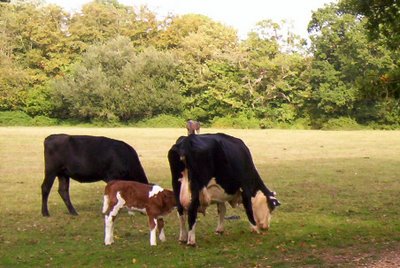Faynights
Tuesday, February 13, 2007
Sunday, December 03, 2006
You've been sleighed
It seems like a date that ought to be marked somehow - last night, the Second of December 2006, in an act of desperation I tuned the kitchen radio to Virgin. And for the first time this year I heard 'Merry Xmas Everybody' by Slade. It's almost like an annual rite of passage isn't it?Friday, October 06, 2006
Every minute of every hour, I love a sunflower
Hi folks, sorry it's been a bit quiet lately. So there's something new this month, I thought I'd experiment with photoblogging: here are a couple of snaps I took near work a couple of weeks ago. I've attempted to crop them so as to protect the privacy of the people who live in the houses.

Ideally, I suppose I should have started taking photos in the summer when the flowers are in fuller bloom; but then I suppose ideally I should have known what I was doing.
And here's a picture of a calf we saw in the New Forest. Aaah.

Thursday, August 31, 2006
There will be no white flag above my door
I meant to mention a while ago something I'd seen recently as part of the bloom of St. George's Crosses during the World Cup. One, probably intended for a car but seen sitting on a garage, bore the name of a well-known manufacturer of glue products in one of the white squares. You know, in a lot of countries people would find it offensive to do that to their flag.The other morning I saw it in the gutter. It had probably been blown there by high winds, but it caught my eye precisely because it hadn't occured to anyone to remove it from there. Myself included actually; and for all that "English" isn't the first word I think of to describe myself, it's odd that it had no effect on me. It only struck me as something I could mention to Laura as a counterpoint to her experiences in the US and as an amusing point to make on the blog. Strange nation, we are.
Wednesday, August 02, 2006
But there's no reason to cry
In recent years there haven't been a lot of reasons to praise the world's record companies. So I thought it was only fair to give some public recognition to Lo-Max Records, the label that released the final Go-Betweens album I mentioned in a previous post. After complaints about the sound quality on the original CD, they not only remastered the album but kindly offered to exchange the discs for those of us who bought the original version at no charge. I got mine by return of post too. How many other labels would do that for you?One good turn deserves another, so here's a plug: if you haven't got the album at all, you can obtain it in the usual places, or Lo-Max's online shop.
Sunday, July 09, 2006
How should I feel?
You know, it's not really my place to fuss about the withdrawl of Top Of The Pops, especially not several weeks too late. But it is my place to be a pedant, so let's have a quick look at this response from the usually trustworthy Economist. It's not that I always agree with their position on an issue, but the level of research is impressive. So how did some of this slip through?A fair start, there, although I'm not sure how many acts really did refuse to show up - the Clash are the obvious ones, and New Order refused until they were finally permitted to attempt a live 'Blue Monday' - and over the years the programme did have dalliances with a no-miming policy which proved less than succesful. There's no question that the naffest incarnation of the show was also the most popular. There follows a reasonable reference to the alternative outlets for musis in the multi-channel world, but then it goes a bit wrong:
FOR a comparatively young genre, pop music is suspiciously full of “historic” moments. But the announcement on June 20th that the BBC was to cancel Top of the Pops (ToTP), a weekly tour of the singles chart that has been broadcast since 1964, surely qualifies. The programme itself was embarrassingly naff: presenters often seemed bemused by the bands; many acts refused to perform, objecting to the requirement to mime along to a pre-recorded track; and skimpily clad dancers were a main attraction. Nevertheless, at the height of its popularity in the 1970s, 15m people tuned in each week.
More recent is the rise of the internet, which has made finding new music even easier. In March Britain made musical history when an American band named Gnarls Barkley reached the top of the singles chart before its song was available in shops. For the first time anywhere, a song had been propelled to the top spot entirely by internet downloads.
Anywhere?
But let's overlook that question and get to the actual point here. It's true that Gnarls Barkley (actually a duo, but that's fair enough) reached the top of the singles chart on download sales alone before the single was released in the UK - but the fact that they were the first is not necessarily unconnected to the fact that a change in chart rules a few weeks previously had allowed download sales to be counted the week before physical release; had they sold as many downloads three weeks earlier it would have made no difference. In fact, sales of the record increased when the CD single appeared, with even its download sales more than doubling (presumably as a result of the publicity). What really matters though is why people were downloading it - they may have had a slightly novel way of purchasing it but the reasons were the same as always: it was a huge radio hit. Furthermore:
Sandi Thom, a Scottish singer, recently signed a £1m contract with Sony after tens of thousands of internet users watched her play live “concerts” from the basement of her Tooting flat. (Some think her success was masterminded by Sony from the start.)Actually, more of us think her manager orchestrated it. But again, that doesn't really matter because for the bulk of its history, TotP refused to feature a record until it had entered the chart, and they wouldn't repeat it unless it was Number One or had increased its sales by a certain amount. Under modern industry conditions that would be more difficult, which may well be why the rules were abandoned some years ago, but the fact remains that it's never been the job of the programme to find the hits, even though it was a valuable promotional tool once upon a time. It was supposed to report the hits that were already happening, by whatever means. Personally, breaking that link was one of the things that put me off the programme around the turn of the century (that and age of course) because it began to lack a real raison d'etre when the big stars could waltz straight on to it with a performance they'd taped months in advance. By the time they were desperate enough to combine it with TOTP2, thus interspersing new and old performances to avoid satisfying anybody, it seemed to become a waste of time and the writing was really on the wall. I'm still a little grudging in admitting this, but if it really couldn't survive in its original form it's better off being put out of its misery.
The better news is that, for the time being at least, the website is staying up. I've been enjoying their Blog Party archives, and there are a few brief clips of performances through the ages. New Order? They ended up miming 'Regret' on a beach.
Sunday, June 18, 2006
Watching the wheels go round and round...
Somehow, it seems like I've been too busy reading other people's blogs to add anything to my own lately. I'm still around though, so maybe it's time for a few little updates on what's happened in the last couple of months. In no particular order:The Perishers ends six months after the demise of Maurice Dodd. It seems only right not to continue the strip without him, especially as it wasn't at its best towards the end, but it's a pity that it faded away like this, with all the books long out of print.
Grant McLennan, co-founder of The Go-Betweens, died in early May. It was barely a year since the release of the album Oceans Apart, one of their finest. You can read an obituary at No Rock & Roll Fun or check out Sweeping The Nation's guide.
George Bush did something stupid. I didn't actually need to check that bit.
England have managed to score some goals.
And on a self-promoting note, the Hit Parade Blog has now entered the Top 30.